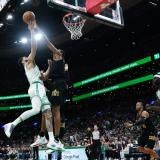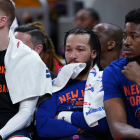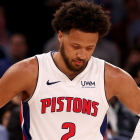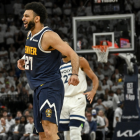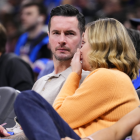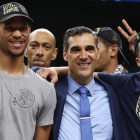What do NBA All-Stars Steph Curry, Steve Nash and Gordon Hayward all have in common?
Each player is proof that the idea behind Sam Hinkie's "Process" can work.
As Hinkie's Philadelphia 76ers went through one of the worst stretches in NBA history -- trading away all their talent to gain future draft assets, tying the NBA record for the longest losing streak and nearly setting the record for the worst season ever -- there was always a philosophical underpinning to the tanking. Take the long view, Hinkie told us. NBA franchises must zig when others zag, he said. Trust the process.
For this he was mocked and derided, hated by Philadelphia fans and held up as a basketball pariah exploiting the system in the most unsportsmanlike fashion: Losing now to win later. He came in with the smartest-guy-in-the-room mentality, but quickly became the butt of the joke. Here's a sampling of Deadspin headlines on Hinkie from around the time he was pressured out of his job a year ago:
"Sam Hinkie Still Has No Idea What He's Talking About."
"The Idea Behind The Process Is Wrong, And Always Has Been."
"Sam Hinkie Memorial Award for Worst GM."
Fair enough, if you're prisoner to the moment. The Sixers were historically terrible, and Hinkie was the purposeful architect of that. But as we count down to next month's draft, in which the Sixers won the third overall pick and also have three second-rounders, it's worth a reassessment of Hinkie's legacy.
And guess what? He was right all along.
The Process that sent the 76ers into a few years of oblivion is working.
It's what Hinkie always said from the beginning: The Process can work, but only if you have patience. Immediacy often can be the enemy of success in the NBA. If you judged Curry after three seasons, he was still too small, too fragile to be a great NBA player. If you judged Nash after three seasons, he was a below-replacement-level starting point guard, not a future MVP. If you judged Hayward after three seasons, he was a nice third or fourth option, not a max-level player.
And if you judged Hinkie three seasons into The Process -- which the Sixers did last year as the door hit him on the way out -- you saw an abject failure of a general manager.
But Hinkie always said The Process was about patience over immediacy. And it turns out the Stanford MBA – the man who brought Silicon Valley buzzwords into the NBA, who attempted to upend and disrupt the league by taking what he called the long view -- ended up being the smartest man in the room after all.
Because the situation this franchise is in today is enviable, and it's all because of the often-chaotic, always-controversial 35 months that Hinkie spent in charge.
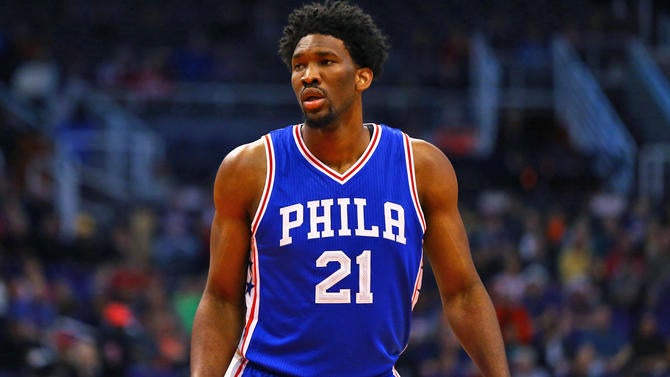
Joel Embiid (if he can stay healthy) is on the cusp of becoming a transcendent NBA player. Dario Saric was last week named, along with Embiid, a finalist for rookie of the year, and has future Sixth Man of the Year written all over him. Ben Simmons, last year's No. 1 pick, sat out last season from injury but could become a unique point-forward in the mold of LeBron James. There are plenty more complementary players that Hinkie picked up along the way too: Nik Stauskas is still a remarkable shooter, Richaun Holmes is a big-bodied athlete, Timothe Luwawu-Cabarrot has the size and athleticism to become a high-impact NBA wing, and Furkan Korkmaz (the 26th overall pick last year currently stashed in Turkey) is a dynamic scorer from all over the court who shot 41 percent from 3-point range in the Turkish league.
With the third overall pick in this year's stacked draft, the Sixers have a shot at yet another future star: Kansas' Josh Jackson, or Kentucky's De'Aaron Fox, or Duke's Jayson Tatum, or Florida State's Jonathan Isaac. I understand we've been talking about the Sixers' "potential" for years, but I'm not sure there's a roster in the league with as much youthful talent. The only other ones that should be in the conversation are the Minnesota Timberwolves, the Milwaukee Bucks and perhaps the Phoenix Suns.
Let me offer another franchise as the corollary to the 76ers. While Hinkie was busy taking the long view, his mirror image, former Brooklyn Nets general manager Billy King, was doing the opposite. The charge Nets owner Mikhail Prokhorov gave King when he hired him in 2010 was to win now -- to bring a championship to Brooklyn in the next five years. So King did what he could to mortgage the future for the now. He tried to microwave success. In three years King traded away seven first-round picks, including one of the worst trades in NBA history with the Boston Celtics, where he sent three first-round picks, including what would become the No. 1 overall pick in this year's draft.
There was plenty of excitement in Brooklyn when the Nets brought in Kevin Garnett and Paul Pierce. And there was plenty of anger in Philadelphia when the roster looked like it belonged more in the D-League than the NBA. But who would you rather be heading into the 2017-18 season: Bryan Colangelo, who replaced Hinkie a year ago when Hinkie was pushed out, or Nets general manager Sean Marks, who replaced King? Marks may have the toughest job in the business, with a pathetic roster and still-depleted stable of future draft picks. Colangelo? The 76ers roster is still filled with lottery tickets, and if just a couple of those hit, this franchise will be set for years.
America in 2017 is the ultimate society of immediacy. Breaking news pops up on our phone moments after it happens. Goods you buy on Amazon Prime arrive at your house within the hour. The credo of Silicon Valley is that if a startup is going to fail, be sure to fail quickly so you can move on to the next big idea. We are the ultimate microwave society. And that leaves no room for the slow-cooker.
This goes beyond re-adjudicating Sam Hinkie and The Process. There are plenty of talented players in next month's draft who need a team that takes a Hinkie-esque long view. Isaac, Florida State's versatile forward, is a physical marvel, but he'll take a while to blossom physically and to catch up to the NBA game. Kentucky's Fox is a beautiful two-way point guard, but zero NBA point guards this season shot worse from three than Fox's 24.6 percent in college. Duke's Harry Giles could eventually become a star, but it'll be as a completely different player than we saw in his injury-riddled college season. None of these players will become overnight successes, but all of them can become All-Stars. Patience is a virtue in this league. Unfortunately, it's a virtue few owners or fan bases give a general manager.
That mentality is what led to the crashing and burning of Hinkie's NBA career, which was one of the most disruptive and controversial careers in recent sports history. And that mentality -- of a society that has lost its capacity for patience, and has lost all the benefits that come from it -- can be destructive. It destroyed Hinkie's NBA career just as his franchise was beginning to show the fruits of his labor.
Things may still go in the wrong direction for the Sixers. Jahlil Okafor appears unfit for today's NBA. The Nerlens Noel trade -- made by Colangelo -- may turn out awful in retrospect. Embiid may end up as an injury-riddled player who never touched his potential. (This is something Hinkie realized, and addressed in his 13-page resignation letter: "You can be right for the wrong reasons. In our business, you're often lionized for it. You can be wrong for the right reasons. This may well prove to be Joel Embiid.")
But right now it sure looks like The Process is working.
In Hinkie's resignation letter, he included a poignant quote from Abraham Lincoln: "Give me six hours to chop down a tree and I will spend the first four sharpening the axe." Hinkie sharpened the axe for the 76ers for three seasons. But now, since we didn't have the patience to let the architect of The Process see it to its conclusion, it's left to another man to chop down the tree.








